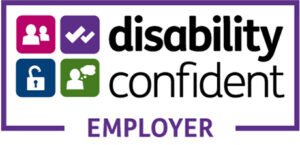
Disability is one of the protected characteristics that is defined under the Equality Act. Any discrimination based on disability is unlawful and we carry out People Impact Assessments to protect our community and staff from this. For more information around our legal duties, click here.
So, how do we consider disability as a protected characteristic in practice?
In our communities
We know that someone with a disability has many abilities, and we just need ensure that everyone has equal access to the services we offer. We also know that not all disabilities are visible.
We are aware through referrals from our partners, direct referrals from members of our communities, and specialist computer modelling software, that some individuals living with long-term illness or disability may be at an increased risk when it comes to fire. We proactively visit these residents to carry out Safe & Well visits, supporting individuals to live safely in their home.
Everyone has bespoke needs and we work with our communities to identify how we can best support them. For example, we have additional measures and resources in place to support individuals living with mobility, sight and hearing impairments, such as specialist detectors for deaf people.
We also work in partnership with lots of different groups like Better Balance, Dementia Friends, Age UK, NHS and others to continually improve the support we are able to offer to best meet the needs of these individuals.
We recognise that those struggling with mental health may require a different form of support, and we work closely with a range of community mental health teams to ensure we understand the needs of these individuals. Further partnerships include energy providers, who are able to refer their vulnerable customers to us for a Safe & Well visit.
Within our workforce
As a Disability Confident employer, we are committed to ensuring that those living with a disability have equal access to inclusive and accessible recruitment, and provision of reasonable adjustments during recruitment and employment.
Just under 3% of our staff have declared a disability, and our Health & Wellbeing team are available to offer support. They seek to identify reasonable adjustments to equipment, working patterns, or anything else to find a suitable solution that will aid staff in effectively performing their role.
We celebrate the power of neurodiversity but recognise the challenges this can bring. We therefore work to build a safe workplace where staff who are struggling can ask for support. This also includes accommodations for anyone who has not had an assessment or diagnosis for neurodivergence.
Research suggests that members of the emergency services are at an increased risk of experiencing mental health issues when compared to the general population, but are less likely to seek support. We’re mindful of remaining stigmas around mental health and we work to ensure everyone can freely speak about their mental health just as much as their physical health.
Below are a few of the things we are doing to make sure the mental health of our workforce is a priority:
- Our dedicated Health & Wellbeing team can offer a vast array of support including free counselling services and referrals to the Fire Fighters Charity.
- DWFRS Guardians offer support and guidance to empower staff to speak up about anything and everything preventing them from being and doing their best.
- Our Staff Networks cover many subjects and create safe spaces for colleagues to share their experiences.
- We have signed the Mental Health at Work Commitment with Mind and the Mental Health At Work Leadership Council. This means we prioritise mental health and wellbeing at work.

